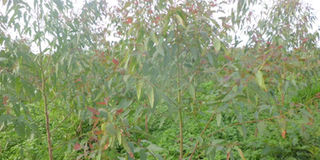FAO empowers leaders to promote tree-planting for energy output

Forests and woodlands in Uganda are believed to be reducing in size due to a number of human activities.
One such activity is engagement of farmers in growing crops and raring animals which require clearing of woodland and forests which sometimes is used as firewood directly or burning of charcoal which can also be used as a source of energy for cooking.
However, in a bid for the farming communities in Uganda’s countryside particularly Luwero District to embark in growing more trees, the food and Agriculture Organisation (FAO) in implementing some of its activities in its five year project that started in the year 2013, with the help of church leaders is helping in the rejuvenation of tree growing.
FAO representative in Uganda, Alhaji M. Jallow explaining the genesis of this project said, it is part of the comprehensive agricultural programmes the organisation has been implementing with various partners including Ministry of Agriculture, Ministry of Water and Environment among others.
Case study
The Rev Fr Joseph Mary Kavuma of Nandere Catholic Parish who is trying to engage the farming community in Nandere Village in Luwero District, explains that since the community living around this village that comprise of 14 Sub-counties are engaged in growing crops and keeping animals for their livelihoods, there has been drastic cutting of trees to clear land for farming.
By engaging communities, the Global Climate Change Alliance (GCCA) is meant for agriculture adaptation to climate change in Uganda project with tree planting as one of the components to mitigate impacts of climate change.
Fr Kavuma and his team have since established a demonstration garden where they have planted Eucalyptus trees on a one acre piece of land which is close to Nandere forest reserve.
This is to interest members of the community around the parish in growing trees as a source of energy.
Nandere forest reserve which used to be heavily populated with trees is slowly getting depleted since the communities that live around it are cutting down trees for making charcoal and firewood as source of energy.
Practical approach
However, Fr Kavuma contends that with the sensitisation exercise going on, most people engaged in farming are trying their best to grow trees alongside their farms.
The challenge of depleting this forest is mainly because most people have turned to charcoal burning which is quick income earning activity. Most of this charcoal has ready market in Kampala where majority of city dwellers cook using charcoal as hydroelectricity is expensive to afford.
Heny Ahibisibwe working with the Ministry of Water and Environment in implementing programmes related to Bio energy is involved in training the farming community in this village on how to set up demonstration gardens for tree planting.
He gives technical support on how to grow trees and which seedlings are suitable in a particular environment and can grow well in a particular soil type.
The purpose is for these farmers to produce fuel wood which if well cared for can be sold off as electricity polls, wood for construction purposes, firewood and charcoal burning which should not be dependent on the available natural forest.
What you ought to know
According to Ahimbisibwe, a eucalyptus tree, which is left to grow for four years, can be used for building; the one left to grow for seven years can be used as electricity poles while those that grow between 10 and 12 years are good for timber.
Therefore, a farmer who is engaged in growing crops, keeping animals and growing trees for biofuel stands a better opportunity of earning increased income for a better livelihood.
Other sensitisation messages are mainly about conservation of Nandere forest, which is now on 100 acre land compared to previous years where the acreage was more.
Much of the sensitisation is done by the priests during Sunday service where people who come to pray are mainly farmers who deserve such information.
However, the current project which is focusing on tree planting, growing crops such as coffee and coffee nursery operations is being implemented in the districts of Luwero, Nakasangola, Nakaseke, Sembabule, Kiboga and Mubende.
It is a €14m project called Global Climate Change Alliance (GCCA) supported by the European Union. The Republic of Ireland contributed 11 million Euros, while Belgium donated 3 million Euros.
As the farming communities in these districts are carrying out their normal farming activities to earn income and live good livelihoods, FAO and its implementing partners encourage them to make briquettes, fuel wood and preserve it as source of fuel energy as well as growing of eucalyptus trees which they can sell to electricity companies for rural electrification where poles can be used for fixing electricity lines.
Background
In considering the larger programme, part of which was implemented in the year 2010 – 2014, $97m was solicited from a number of development partners to carry out activities with farmers in various locations in the country covering the entire agricultural value chain ranging from production, harvesting through to value addition in different crops.
For instance in Karamoja, some of the activities involved at looking at animal health since the communities there are mainly cattle keepers.




